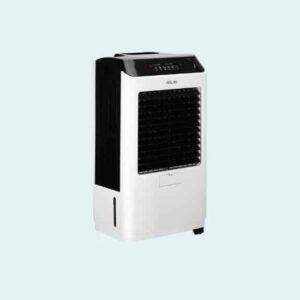Evaporative air cooling, is a cost-effective and energy-efficient alternative to traditional air conditioning systems. The key principle behind evaporative cooling is the natural process of water evaporation, which absorbs heat and cools the surrounding air. This method stands in stark contrast to traditional air conditioning, which relies on refrigeration cycles and compressors. In this essay, we will delve into the reasons why evaporative air cooling is more cost-effective than traditional air conditioning, examining factors such as energy consumption, installation costs, and environmental impact.
One of the primary advantages of evaporative air cooling is its significantly lower energy consumption compared to traditional air conditioning. Traditional air conditioners use compressors to cool the air, a process that demands a substantial amount of electricity. In contrast, evaporative coolers consume far less energy because they rely on the natural process of water evaporation. The main energy expenditure in an evaporative cooler is the fan that circulates air through the water-saturated pads. This fan consumes significantly less energy compared to the compressors used in traditional air conditioning systems. As a result, the operational costs of evaporative cooling are considerably lower, making it a more cost-effective option for cooling large spaces.
See our range of cost-effective mobile evaporative air coolers here:
Evaporative air cooling, is a cost-effective and energy-efficient alternative to traditional air conditioning systems. The key principle behind evaporative cooling is the natural process of water evaporation, which absorbs heat and cools the surrounding air. This method stands in stark contrast to traditional air conditioning, which relies on refrigeration cycles and compressors. We will delve into the reasons why evaporative air cooling is more cost-effective than traditional air conditioning, examining factors such as energy consumption, installation costs, and environmental impact.
Lower energy = lower cost
Installation costs also favor evaporative air cooling over traditional air conditioning. Traditional AC systems are complex and require the installation of a network of ducts, a refrigeration unit, and often a complex control system. The installation of traditional air conditioning systems can be time-consuming and expensive, especially in existing buildings where retrofitting may be necessary. On the other hand, evaporative coolers are simpler in design and easier to install. They consist of a fan, water distribution system, and pads. In many cases, evaporative coolers can be installed without the need for extensive ductwork, reducing both time and costs associated with installation. This makes them an attractive option for both new constructions and retrofitting existing buildings.
Maintenance costs also contribute to the overall cost-effectiveness of evaporative air cooling. Traditional air conditioning systems often require regular maintenance to ensure optimal performance. This maintenance includes tasks such as cleaning or replacing filters, checking refrigerant levels, and inspecting the ductwork for leaks. Evaporative coolers, by comparison, have simpler maintenance requirements. The primary components that need attention are the water pads, which may need occasional cleaning or replacement, and the water distribution system. Regular maintenance of these components is generally less complex and less costly than the maintenance tasks associated with traditional air conditioning systems.
The environmental impact is another crucial aspect where evaporative cooling outshines traditional air conditioning. Traditional AC systems use refrigerants, which can be potent greenhouse gases and contribute to ozone layer depletion if not handled properly. Evaporative coolers, being based on the natural process of water evaporation, do not rely on harmful refrigerants. Additionally, evaporative cooling systems use significantly less electricity, reducing overall carbon emissions associated with energy production. In regions where water is abundant, evaporative cooling can be an environmentally friendly and sustainable choice.
Moreover, evaporative air cooling provides additional benefits beyond cost-effectiveness. It introduces fresh outdoor air into the indoor environment, promoting better indoor air quality by continuously exchanging and ventilating the air. This constant air circulation helps reduce the buildup of indoor pollutants, allergens, and odors, contributing to a healthier and more comfortable living or working environment.
Evaporative air cooling stands as a cost-effective and environmentally friendly alternative to traditional air conditioning. Its lower energy consumption, simpler installation, and reduced maintenance costs make it an attractive option for both residential and commercial applications. As society continues to prioritise energy efficiency and environmental sustainability, evaporative air cooling emerges as a compelling solution that aligns with these goals, providing a viable alternative to traditional air conditioning systems.
To learn more about our range of evaporative air cooling call John Lawton on 086 1715280

